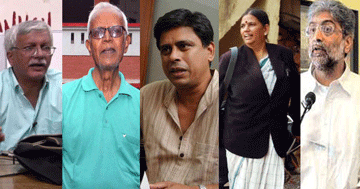Goa is abuzz with excitement as vintage bike and car owners, users, collectors and fans are decking […]

MODI DESTROYS DEMOCRACY IN INDIA!By Mauktik Kulkarni
In the News, Nov 20- Nov 26 2021 November 19, 2021MURDERED: The elderly tribal activist Stain Swamy who was denied even essential items like a straw due to his Parkinson disease died in police custody after being denied bail for two years. The latest instance is the denial of bail to Aryan Khan son of Aryan Khan who refuse to campaign for the BJP in Uttar Pradesh.
By Mauktik Kulkarni
Over the seven years that Narendra Modi has been Prime Minister he has destroyed democracy in the country. Modi has established a dictatorship which does not tolerate any dissent. As dramatized by the case of Stain Swamy and 80 year old activist who died in jail because he was not given any medical facility.
The seven-year itch is said to describe the sense of ennui among couples that have been together for that long. In the case of Prime Minister Narendra Modi, his sustained assault on India’s democratic traditions since 2014 has left the country gasping for breath.
This is the first time that independent India has had a conservative government, at least on paper, with a strong majority for more than one term. Conservative politics is usually an uneasy alliance between social and economic conservatives. In theory, a lower-tax regime with minimal regulation leads to a dynamic economy with robust job growth, which often leads to the acceptance of more religion in the public sphere. While there is plenty of data to dispute the assumptions of economic conservatism and job growth, political parties in liberal democracies are roughly split along these ideological lines.
Policy failures
With macroeconomic factors like the government’s heightened borrowing, persistent inflation, historically high unemployment and rising household debt, Modi will be lucky to eke out an average of 6%-7% annual GDP growth for his first ten years. This sub-par performance is partially responsible for India’s declining fortunes in its neighbourhood as well as globally.
With its house in disarray and a widening gap with China, India lacks the ability to offer meaningful diplomatic, financial or military support to its smaller South Asian neighbours vis-à-vis China. China’s prolonged occupation of Indian territory and continued military pressure along the frontier have made Bhutan, Nepal, Bangladesh and Sri Lanka second-guess their long-standing relationship with India.
Earlier this year, the US handed over Afghanistan to the Taliban in a process in which New Delhi, despite its two decades of investment in rebuilding the war-torn country, was not even invited at the table. Long-term proponents of aligning India with the United States and other liberal democracies are cheering the formation of the Quad with the US, Australia and Japan. However, as the stalled trade talks with the US indicate, India is joining the grouping not from a position of strength, but out of necessity. India seems to be primarily trading its cheap labor and possibly cheap manufacturing for advanced military hardware, intelligence cooperation, implicit security guarantees and access to capital.
Yet, with sky-high approval ratings, Modi pretends as if everything is fine in India. With one of the youngest populations in the world, requiring double-digit growth just to keep up with the sheer number of job seekers entering the workforce every day, India is, unfortunately, churning out more internet troll armies, brainwashed Hindutva supporters and religious mobs than entrepreneurs, scientists and rational thinkers. A large part of the crisis can be traced to three critical issues the Supreme Court has been ignoring for the past few years: anonymous political fund-raising, the moribund Right to Information Act and Modi’s assault on federalism since 2014.
Money in politics
When the Modi government pushed the anonymous electoral bond scheme through the Parliament in 2017, the Election Commission and the Reserve Bank of India had vehemently opposed it on multiple grounds. It did not just go against the citizens’ right to know where political parties’ monies are coming from, but also opened up Indian democracy to foreign influence. The electoral bond scheme has skewed the game in favour of the ruling party.
The Supreme Court has noted that the funding scheme poses grave constitutional questions but has effectively shelved the case.
Meanwhile, the BJP has built a sophisticated propaganda machine that keeps feeding Hindutva’s cultural supremacy rhetoric and spinning failures as successes every day, creating a bizarre alternate universe for the electorate. With the Centre’s vice-like grip on policymaking and unfair access to electoral funding data, opposition parties are no match for the BJP in fundraising and, consequently, reaching the electorate.
Authoritarian tendencies
The Right to Information Act is another victim of Modi’s duplicity on his promise of transparency. When it was enacted in 2005, the Act was hailed as the successful culmination of decades of grassroots campaigning and struggle of the civic society. The one-two punch of Modi undermining the independence of information officers and then starving the institution of personnel and resources has considerably weakened the law. At the same time, Modi is engaged in a frontal assault on India’s federal structure. For instance, Modi rendered the duly elected government of the state of Delhi powerless and handed over the state to the centrally appointed Lieutenant Governor.
Armed with the alphabet soup of draconian laws like the Unlawful Activities (Prevention) Act, National Security Act and Narcotic Drugs and Psychotropic Substances Act, 1985, Central investigative agencies like the National Investigation Agency, Narcotics Control Bureau, Enforcement Directorate and Central Bureau of Investigation can swoop in, usurp the law and order powers of states, and lock up government critics without due process for years. This makes the process the punishment.
The Supreme Court is yet to pass judgments on scrapping Article 370, which gave the state of Jammu and Kashmir nominal autonomy under the Indian Constitution, or the reorganisation of the state of Delhi, which rendered the duly elected state government powerless and handed over the state to the centrally appointed Lieutenant Governor. While the court has passed limited judgments in some high-profile cases under the Unlawful Activities (Prevention) Act and the Narcotic Drugs and Psychotropic Substances Act, it has failed to permanently contain the worst features of these draconian laws. States like West Bengal and Maharashtra, with powerful regional leaders and some financial muscle, can occasionally push back against such attacks on federalism. Sadly, most other victims must wait for the judiciary to act.
Future of democracy
After the bad economic policymaking before the pandemic, the disastrous nationwide Covid-19 lockdown of early 2020 and the devastating second wave of the coronavirus in 2021, Modi seems to have realised that he cannot keep pretending that the future is perfectly rosy.
Selling Air India is hopefully the beginning of the long-awaited privatisation drive of public-sector entities. The contentious farm laws – a self-inflicted wound because of the way they were passed – could boost farmers’ income in the long run if Modi can address the concerns of protesting farmers. Production-linked incentives, along with the opening up of the space and defence sectors, could lead to innovation in manufacturing. Luckily for India, Modi’s insecurities, his constant need for the spotlight and craving for international legitimacy seem to counteract his most extreme authoritative tendencies. Shah, Adityanath and Surya seem to lack such scruples.
Courtesy:www,scroll.in















